2022年中考九年级英语语法 冠词全解
文档属性
| 名称 | 2022年中考九年级英语语法 冠词全解 | 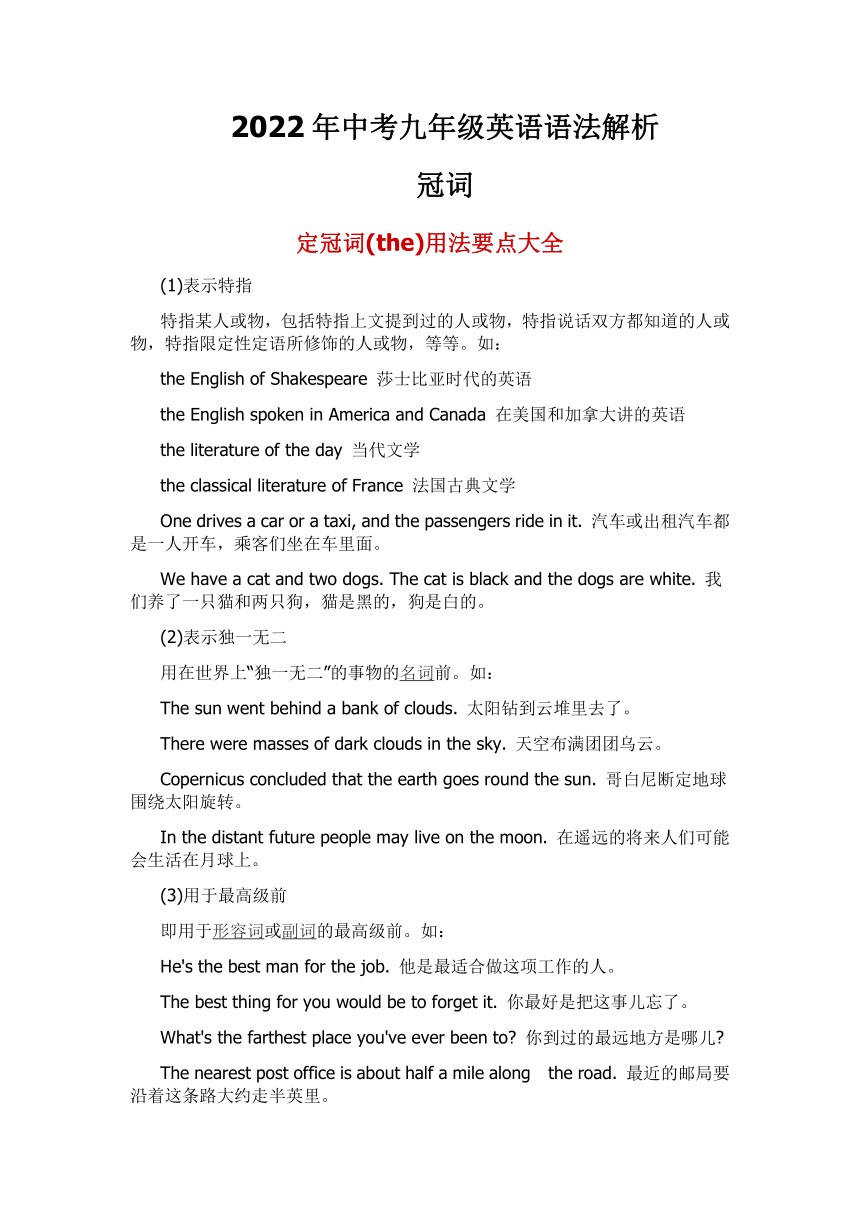 | |
| 格式 | docx | ||
| 文件大小 | 25.9KB | ||
| 资源类型 | 教案 | ||
| 版本资源 | 通用版 | ||
| 科目 | 英语 | ||
| 更新时间 | 2022-03-16 11:23:49 | ||
图片预览

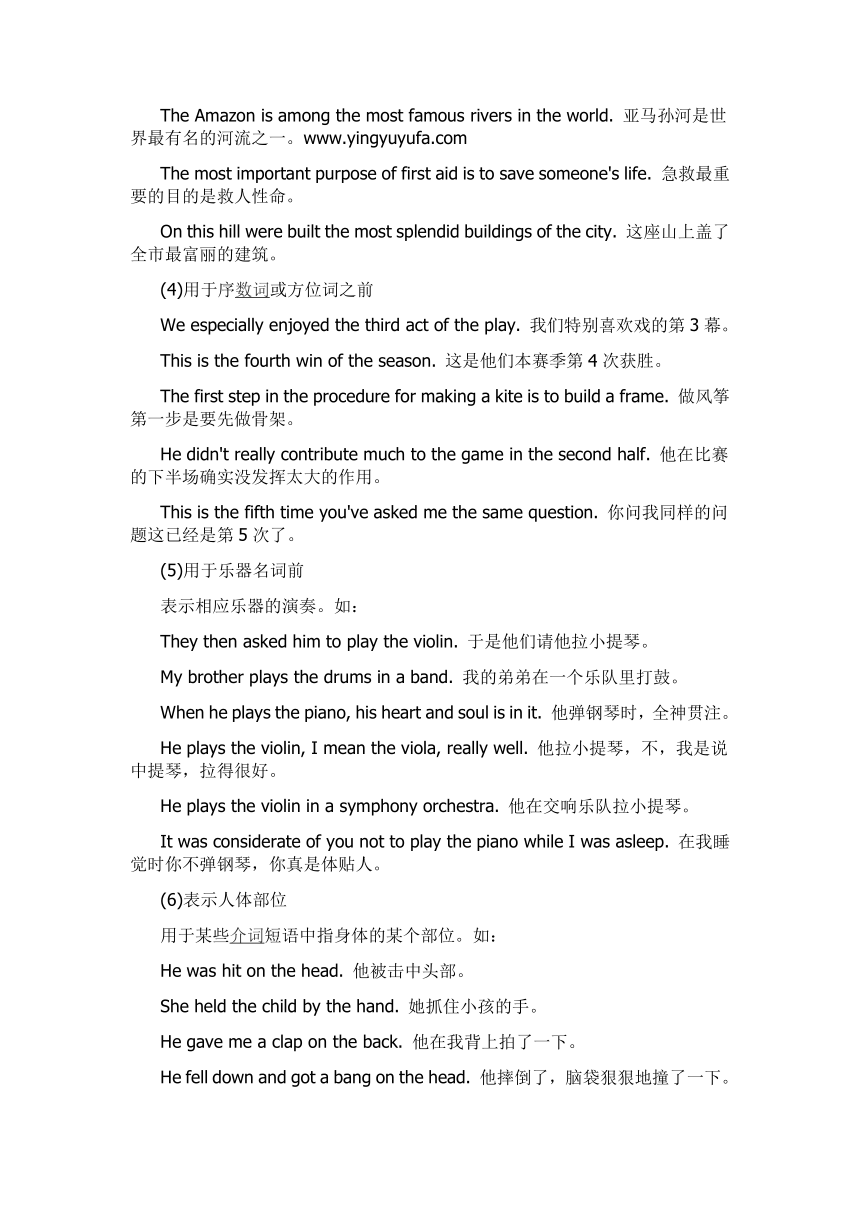
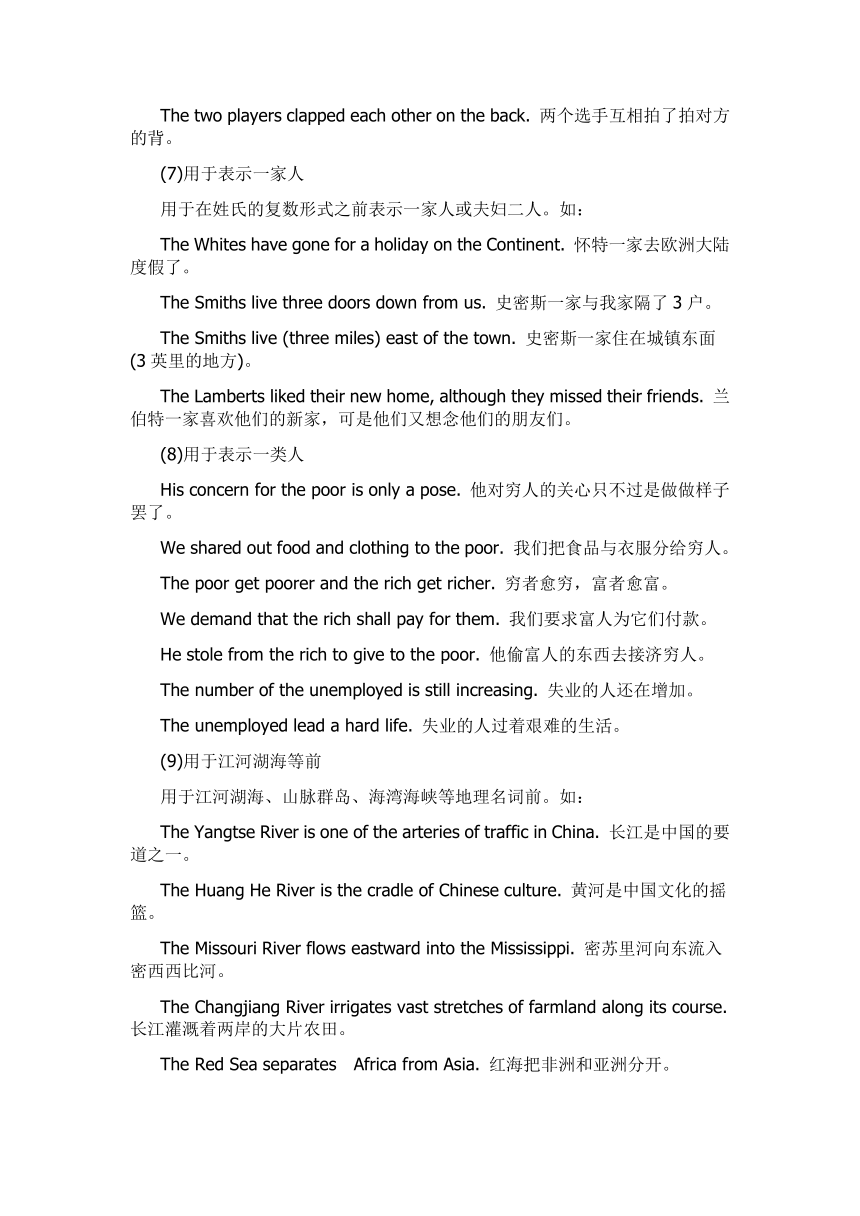
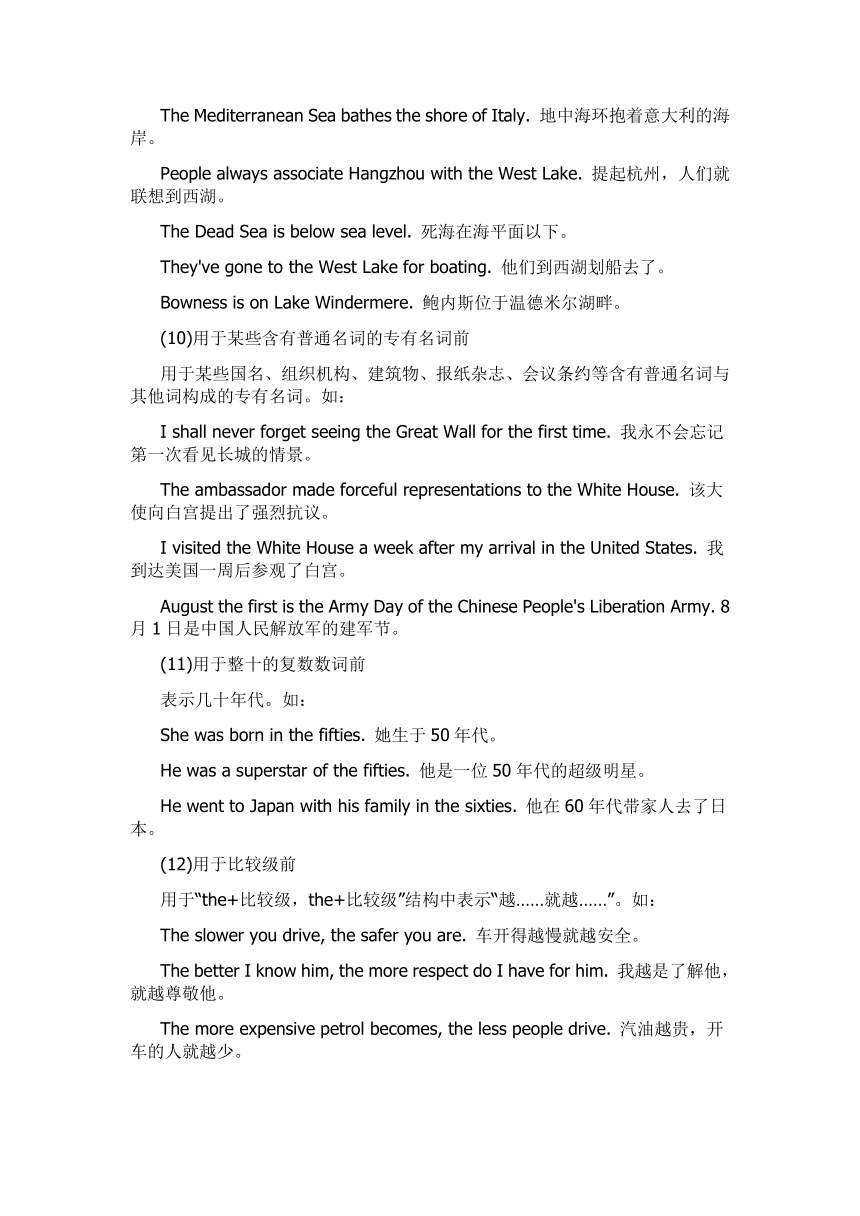
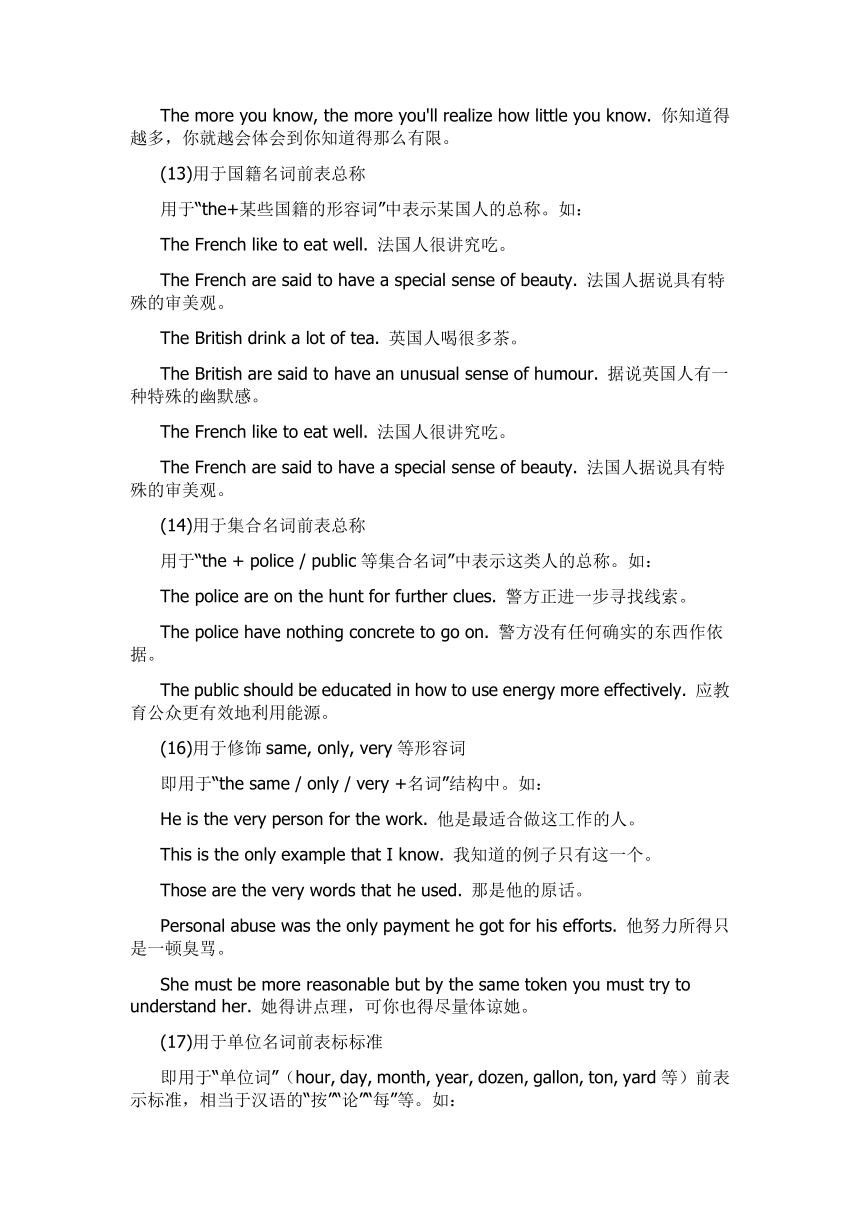
文档简介
2022年中考九年级英语语法解析
冠词
定冠词(the)用法要点大全
(1)表示特指
特指某人或物,包括特指上文提到过的人或物,特指说话双方都知道的人或物,特指限定性定语所修饰的人或物,等等。如:
the English of Shakespeare 莎士比亚时代的英语
the English spoken in America and Canada 在美国和加拿大讲的英语
the literature of the day 当代文学
the classical literature of France 法国古典文学
One drives a car or a taxi, and the passengers ride in it. 汽车或出租汽车都是一人开车,乘客们坐在车里面。
We have a cat and two dogs. The cat is black and the dogs are white. 我们养了一只猫和两只狗,猫是黑的,狗是白的。
(2)表示独一无二
用在世界上“独一无二”的事物的名词前。如:
The sun went behind a bank of clouds. 太阳钻到云堆里去了。
There were masses of dark clouds in the sky. 天空布满团团乌云。
Copernicus concluded that the earth goes round the sun. 哥白尼断定地球围绕太阳旋转。
In the distant future people may live on the moon. 在遥远的将来人们可能会生活在月球上。
(3)用于最高级前
即用于形容词或副词的最高级前。如:
He's the best man for the job. 他是最适合做这项工作的人。
The best thing for you would be to forget it. 你最好是把这事儿忘了。
What's the farthest place you've ever been to 你到过的最远地方是哪儿
The nearest post office is about half a mile along the road. 最近的邮局要沿着这条路大约走半英里。
The Amazon is among the most famous rivers in the world. 亚马孙河是世界最有名的河流之一。www.
The most important purpose of first aid is to save someone's life. 急救最重要的目的是救人性命。
On this hill were built the most splendid buildings of the city. 这座山上盖了全市最富丽的建筑。
(4)用于序数词或方位词之前
We especially enjoyed the third act of the play. 我们特别喜欢戏的第3幕。
This is the fourth win of the season. 这是他们本赛季第4次获胜。
The first step in the procedure for making a kite is to build a frame. 做风筝第一步是要先做骨架。
He didn't really contribute much to the game in the second half. 他在比赛的下半场确实没发挥太大的作用。
This is the fifth time you've asked me the same question. 你问我同样的问题这已经是第5次了。
(5)用于乐器名词前
表示相应乐器的演奏。如:
They then asked him to play the violin. 于是他们请他拉小提琴。
My brother plays the drums in a band. 我的弟弟在一个乐队里打鼓。
When he plays the piano, his heart and soul is in it. 他弹钢琴时,全神贯注。
He plays the violin, I mean the viola, really well. 他拉小提琴,不,我是说中提琴,拉得很好。
He plays the violin in a symphony orchestra. 他在交响乐队拉小提琴。
It was considerate of you not to play the piano while I was asleep. 在我睡觉时你不弹钢琴,你真是体贴人。
(6)表示人体部位
用于某些介词短语中指身体的某个部位。如:
He was hit on the head. 他被击中头部。
She held the child by the hand. 她抓住小孩的手。
He gave me a clap on the back. 他在我背上拍了一下。
He fell down and got a bang on the head. 他摔倒了,脑袋狠狠地撞了一下。
The two players clapped each other on the back. 两个选手互相拍了拍对方的背。
(7)用于表示一家人
用于在姓氏的复数形式之前表示一家人或夫妇二人。如:
The Whites have gone for a holiday on the Continent. 怀特一家去欧洲大陆度假了。
The Smiths live three doors down from us. 史密斯一家与我家隔了3户。
The Smiths live (three miles) east of the town. 史密斯一家住在城镇东面 (3英里的地方)。
The Lamberts liked their new home, although they missed their friends. 兰伯特一家喜欢他们的新家,可是他们又想念他们的朋友们。
(8)用于表示一类人
His concern for the poor is only a pose. 他对穷人的关心只不过是做做样子罢了。
We shared out food and clothing to the poor. 我们把食品与衣服分给穷人。
The poor get poorer and the rich get richer. 穷者愈穷,富者愈富。
We demand that the rich shall pay for them. 我们要求富人为它们付款。
He stole from the rich to give to the poor. 他偷富人的东西去接济穷人。
The number of the unemployed is still increasing. 失业的人还在增加。
The unemployed lead a hard life. 失业的人过着艰难的生活。
(9)用于江河湖海等前
用于江河湖海、山脉群岛、海湾海峡等地理名词前。如:
The Yangtse River is one of the arteries of traffic in China. 长江是中国的要道之一。
The Huang He River is the cradle of Chinese culture. 黄河是中国文化的摇篮。
The Missouri River flows eastward into the Mississippi. 密苏里河向东流入密西西比河。
The Changjiang River irrigates vast stretches of farmland along its course. 长江灌溉着两岸的大片农田。
The Red Sea separates Africa from Asia. 红海把非洲和亚洲分开。
The Mediterranean Sea bathes the shore of Italy. 地中海环抱着意大利的海岸。
People always associate Hangzhou with the West Lake. 提起杭州,人们就联想到西湖。
The Dead Sea is below sea level. 死海在海平面以下。
They've gone to the West Lake for boating. 他们到西湖划船去了。
Bowness is on Lake Windermere. 鲍内斯位于温德米尔湖畔。
(10)用于某些含有普通名词的专有名词前
用于某些国名、组织机构、建筑物、报纸杂志、会议条约等含有普通名词与其他词构成的专有名词。如:
I shall never forget seeing the Great Wall for the first time. 我永不会忘记第一次看见长城的情景。
The ambassador made forceful representations to the White House. 该大使向白宫提出了强烈抗议。
I visited the White House a week after my arrival in the United States. 我到达美国一周后参观了白宫。
August the first is the Army Day of the Chinese People's Liberation Army. 8月1日是中国人民解放军的建军节。
(11)用于整十的复数数词前
表示几十年代。如:
She was born in the fifties. 她生于50年代。
He was a superstar of the fifties. 他是一位50年代的超级明星。
He went to Japan with his family in the sixties. 他在60年代带家人去了日本。
(12)用于比较级前
用于“the+比较级,the+比较级”结构中表示“越……就越……”。如:
The slower you drive, the safer you are. 车开得越慢就越安全。
The better I know him, the more respect do I have for him. 我越是了解他,就越尊敬他。
The more expensive petrol becomes, the less people drive. 汽油越贵,开车的人就越少。
The more you know, the more you'll realize how little you know. 你知道得越多,你就越会体会到你知道得那么有限。
(13)用于国籍名词前表总称
用于“the+某些国籍的形容词”中表示某国人的总称。如:
The French like to eat well. 法国人很讲究吃。
The French are said to have a special sense of beauty. 法国人据说具有特殊的审美观。
The British drink a lot of tea. 英国人喝很多茶。
The British are said to have an unusual sense of humour. 据说英国人有一种特殊的幽默感。
The French like to eat well. 法国人很讲究吃。
The French are said to have a special sense of beauty. 法国人据说具有特殊的审美观。
(14)用于集合名词前表总称
用于“the + police / public等集合名词”中表示这类人的总称。如:
The police are on the hunt for further clues. 警方正进一步寻找线索。
The police have nothing concrete to go on. 警方没有任何确实的东西作依据。
The public should be educated in how to use energy more effectively. 应教育公众更有效地利用能源。
(16)用于修饰same, only, very等形容词
即用于“the same / only / very +名词”结构中。如:
He is the very person for the work. 他是最适合做这工作的人。
This is the only example that I know. 我知道的例子只有这一个。
Those are the very words that he used. 那是他的原话。
Personal abuse was the only payment he got for his efforts. 他努力所得只是一顿臭骂。
She must be more reasonable but by the same token you must try to understand her. 她得讲点理,可你也得尽量体谅她。
(17)用于单位名词前表标标准
即用于“单位词”(hour, day, month, year, dozen, gallon, ton, yard等)前表示标准,相当于汉语的“按”“论”“每”等。如:
We hire out vans by the day. 我们按日出租客货车。
The eggs are sold by the dozen. 鸡蛋按打出售。
Do you sell eggs by the kilo or by the dozen 鸡蛋怎么卖,论公斤,还是论打
但是,by weight(按重量)习惯上不用冠词。如:
Do you charge carriage by weight 你们按重量收运费吗
Are bananas sold by weight or at how much a piece 香蕉是按重量出售, 还是按多少钱一根出售
不定冠词(a / an)用法要点大全
1. 用a 还是用an:一般说来,在辅音或半元音开头的词前用a, 而在元音开头的词前用an:
The hen laid an egg. 那只母鸡生了个鸡蛋。
She has an inborn love of jokes. 她天生爱开玩笑。
The child has an upset stomach. 这孩子肚子不舒服。
注意:有些以元音字母开头的单词,由于第一个音不是元音而是辅音,其前仍用a而不用an:
He has a university degree in economics. 他取得大学经济学学位。
Italy is a European country. 意大利是个欧洲国家。
The family lived in a one-room shack. 一家人住在一间简陋的小屋里。
2. 单数可数名词若泛指,其前需加a / an, 不要从汉语习惯出发,漏掉此不定冠词:
伯灵顿拱廊坫伦敦心著名的购物街。
正:Burlington Arcade is a famous shopping place in London.
误:Burlington Arcade is famous shopping place in London.
4. 专有名词转化为普通名词,其前可用a (an),表示某某人或某某人的一部作品、艺术品等:
There is a Mr Jones to see you, sir. 先生,有一位叫琼斯的先生要见你。
Let's suppose a Mr So-and-so registers at the hotel. 咱们打个比方吧,有个某某先生来旅馆登记。
When he bought the picture he was told it was a Rubens, but he later found out it was a forgery. 有人告诉他那是鲁宾斯的画,但后来他发现那是赝品。
4. 物质名词转化为普通名词,其前可以使用a (an),有时表示相应产品或种类,有时表示数量关系:
She knows a good wine when she tastes it. 她只要一尝就能分辨酒的好坏。
I had a coffee and she had a chocolate. 我喝了一杯咖啡,而她喝了 一杯可可。
5. 在序数词之前使用a (an),可以表示数量或序数的增加:
Soon I saw a second plane. 不久我又看到了一架飞机。
A:This is the second time that I've read the book. 这是我第二次看这本书。
B:Do you want to read it a third time 你还想看第三次吗?
6. 与形容词的最高级连用,表示“非常”“很”等:
They have embarked on a most interesting new plan. 他们己经着手作一个非常有趣的新计划。
He thanked his host for a most enjoyable party. 他感谢主人请他参加一个非常愉快的聚会。
Gascoigne had received an offer of help from a most unlikely source. 贾斯昆从最意想不到的渠道获得资助。
7. 用于修饰名词的定语前,表示某种状态。此时的不定冠词含有类似a kind of 的意思:
The island has a mild climate. 那个岛气候温和。
I have a good breakfast and good meal in the evening, and never trouble with lunch. 我有丰盛的早餐和丰盛的晚餐,从不为午饭操心。
He lives in a world of fantasy. 他生活在幻想的世界里。
8. 不定冠词a (an) 与数词one 都可表示“一”,但是两者有差别:不定冠词 a (an) 表示“类别”概念,而数词 one 表示“数量”概念:
She has a new baby: it was born last week. 她有一个上周才出生的婴儿。
She has a woman who cleans for her twice a week. 她有一个女帮工,每星期帮她打扫两次。
9. 两个单数可数名词连用表示一个整体时,只用一个冠词:
He is a teacher and poet. 他既是老师又是诗人。
There's a horse and cart on the road. 路上有一辆马车。
10. 与副词quite / rather 连用时,a (an) 一般要后置,但若其后的名词前有形容词修饰,则 a (an) 放在 quite / rather 之前或之后均可以:
正:He is rather a fool. 他是个大傻瓜。
正:It is quite a good book. 那是本很好的书。
正:It is a quite good book. 那是本很好的书。
误:He is a rather fool.(因为名词前无形容词,所以错误)
11. 当too, so, as, how 等词之后接有“形容词+单数可数名词”时,不定冠词 a (an) 应放在形容词和单数可数名词之间:
It is too difficult a book for us beginners. 这本书对我们初学者来说太难了。
She is as good a cook as her mother. 她和她妈妈一样是一位好厨师。
No one realized how serious a mistake it was until much later. 直到后来好久,才有人意识到那是一个多么严重的错误。
12. 不定冠词可用来表示“类属”,这是其基本用法,它表明的是某一类属中的每一个人和东西都能说明该类属的整体情况(有类似汉语的“举一反三”或“以此类推”的含义)。此时也可用定冠词或名词复数形式来表示:
马是有用的动物。
正:A horse is a useful animal.
正:The horse is a useful animal.
正:Horses are useful animals. (英语语法)
若不是说明每一个人和东西的情况,而是说整个类属,则不能用不定冠词,而要用定冠词(此时多与“发明”“绝种”这样的意义相联系):
Alexander Graham Bell invented the telephone in 1876. 亚历山大·格雷汉母·贝尔于1876年发明了电话。
The tiger is in danger of becoming extinct. 老虎有绝种的危险。
零冠词(/ )用法要点大全
1. 零冠词用于非特指的季节、月份、星期及三餐等名称前。如:
Monday comes before Tuesday. 星期二在星期一之后。
Won't you stay for lunch 留在这儿吃午饭好吗
I must finish it by end of July. 我必须在七月底前完成它。
2. 用于球类棋类和游戏以及含 day 的节日前。如:
Used you to play football 你过去常踢足球吗
New Year’s Day is a holiday for everyone. 元旦是所有人的节日。
3. 用于作表语、补语、同位语的惟一职位名词前。如:
John is captain of the team. 约翰是足球队的队长。
They elected him president of the society. 他们选他为协会会长。
4. 用于表示“变成”的 turn / go 后作表语的单数名词前。如:
He was a teacher before he turned writer. 他成为作家之前是教师。
5. 用于让步倒装的单数可数名词前。如:
Child as he is, he knows a lot. 他虽然是个孩子,但已经很懂事了。
6. 用于 a kind / sort / type / form / variety of 后的名词前。如:
He is too young for that kind of job. 他太年轻不适合做那工作。
This sort of thing can’t go on! 这样的事不能再进行下去了。
7. 用于某些表示学习、生活、娱乐等的单数名词前,表示相关的活动。如:
go to school (bed, church, town, class, college, etc) 去上学(睡觉,做礼拜,进城,上课,上大学,等)
in bed (school, class, college, church, prison, hospital, etc) 在睡觉(上学,上课,上大学,做礼拜,坐牢,住院,等)
注:若不是指活动,而是指具体的实物,则要用冠词。比较:
go to the bed 到床边去(侧重指“床”这个实体)
go to bed 上床睡觉(侧重指与“床”有关的活动,即睡觉)
8. 用于某些用介词 by 构成的表方式的短语中。如:
by bus 乘公共汽车 by plane / by air乘飞机
by land 走陆路 by sea 走海路
by phone 用电话 by letter 用信件
by post 用邮寄 by hand 用手工
9. 用于表示泛指或一般意义的物质名词、抽象名词、专有名词、复数名词等之前。如:
Knowledge begins with practice. 认识从实践开始。
Smith lives in London. 史密斯住在伦敦。
Teachers should be respected. 教师应该受到尊重。
10. 用于某些独立结构中。如:
The teacher came in, book in hand. 老师走了进来,手里拿着书。
冠词
定冠词(the)用法要点大全
(1)表示特指
特指某人或物,包括特指上文提到过的人或物,特指说话双方都知道的人或物,特指限定性定语所修饰的人或物,等等。如:
the English of Shakespeare 莎士比亚时代的英语
the English spoken in America and Canada 在美国和加拿大讲的英语
the literature of the day 当代文学
the classical literature of France 法国古典文学
One drives a car or a taxi, and the passengers ride in it. 汽车或出租汽车都是一人开车,乘客们坐在车里面。
We have a cat and two dogs. The cat is black and the dogs are white. 我们养了一只猫和两只狗,猫是黑的,狗是白的。
(2)表示独一无二
用在世界上“独一无二”的事物的名词前。如:
The sun went behind a bank of clouds. 太阳钻到云堆里去了。
There were masses of dark clouds in the sky. 天空布满团团乌云。
Copernicus concluded that the earth goes round the sun. 哥白尼断定地球围绕太阳旋转。
In the distant future people may live on the moon. 在遥远的将来人们可能会生活在月球上。
(3)用于最高级前
即用于形容词或副词的最高级前。如:
He's the best man for the job. 他是最适合做这项工作的人。
The best thing for you would be to forget it. 你最好是把这事儿忘了。
What's the farthest place you've ever been to 你到过的最远地方是哪儿
The nearest post office is about half a mile along the road. 最近的邮局要沿着这条路大约走半英里。
The Amazon is among the most famous rivers in the world. 亚马孙河是世界最有名的河流之一。www.
The most important purpose of first aid is to save someone's life. 急救最重要的目的是救人性命。
On this hill were built the most splendid buildings of the city. 这座山上盖了全市最富丽的建筑。
(4)用于序数词或方位词之前
We especially enjoyed the third act of the play. 我们特别喜欢戏的第3幕。
This is the fourth win of the season. 这是他们本赛季第4次获胜。
The first step in the procedure for making a kite is to build a frame. 做风筝第一步是要先做骨架。
He didn't really contribute much to the game in the second half. 他在比赛的下半场确实没发挥太大的作用。
This is the fifth time you've asked me the same question. 你问我同样的问题这已经是第5次了。
(5)用于乐器名词前
表示相应乐器的演奏。如:
They then asked him to play the violin. 于是他们请他拉小提琴。
My brother plays the drums in a band. 我的弟弟在一个乐队里打鼓。
When he plays the piano, his heart and soul is in it. 他弹钢琴时,全神贯注。
He plays the violin, I mean the viola, really well. 他拉小提琴,不,我是说中提琴,拉得很好。
He plays the violin in a symphony orchestra. 他在交响乐队拉小提琴。
It was considerate of you not to play the piano while I was asleep. 在我睡觉时你不弹钢琴,你真是体贴人。
(6)表示人体部位
用于某些介词短语中指身体的某个部位。如:
He was hit on the head. 他被击中头部。
She held the child by the hand. 她抓住小孩的手。
He gave me a clap on the back. 他在我背上拍了一下。
He fell down and got a bang on the head. 他摔倒了,脑袋狠狠地撞了一下。
The two players clapped each other on the back. 两个选手互相拍了拍对方的背。
(7)用于表示一家人
用于在姓氏的复数形式之前表示一家人或夫妇二人。如:
The Whites have gone for a holiday on the Continent. 怀特一家去欧洲大陆度假了。
The Smiths live three doors down from us. 史密斯一家与我家隔了3户。
The Smiths live (three miles) east of the town. 史密斯一家住在城镇东面 (3英里的地方)。
The Lamberts liked their new home, although they missed their friends. 兰伯特一家喜欢他们的新家,可是他们又想念他们的朋友们。
(8)用于表示一类人
His concern for the poor is only a pose. 他对穷人的关心只不过是做做样子罢了。
We shared out food and clothing to the poor. 我们把食品与衣服分给穷人。
The poor get poorer and the rich get richer. 穷者愈穷,富者愈富。
We demand that the rich shall pay for them. 我们要求富人为它们付款。
He stole from the rich to give to the poor. 他偷富人的东西去接济穷人。
The number of the unemployed is still increasing. 失业的人还在增加。
The unemployed lead a hard life. 失业的人过着艰难的生活。
(9)用于江河湖海等前
用于江河湖海、山脉群岛、海湾海峡等地理名词前。如:
The Yangtse River is one of the arteries of traffic in China. 长江是中国的要道之一。
The Huang He River is the cradle of Chinese culture. 黄河是中国文化的摇篮。
The Missouri River flows eastward into the Mississippi. 密苏里河向东流入密西西比河。
The Changjiang River irrigates vast stretches of farmland along its course. 长江灌溉着两岸的大片农田。
The Red Sea separates Africa from Asia. 红海把非洲和亚洲分开。
The Mediterranean Sea bathes the shore of Italy. 地中海环抱着意大利的海岸。
People always associate Hangzhou with the West Lake. 提起杭州,人们就联想到西湖。
The Dead Sea is below sea level. 死海在海平面以下。
They've gone to the West Lake for boating. 他们到西湖划船去了。
Bowness is on Lake Windermere. 鲍内斯位于温德米尔湖畔。
(10)用于某些含有普通名词的专有名词前
用于某些国名、组织机构、建筑物、报纸杂志、会议条约等含有普通名词与其他词构成的专有名词。如:
I shall never forget seeing the Great Wall for the first time. 我永不会忘记第一次看见长城的情景。
The ambassador made forceful representations to the White House. 该大使向白宫提出了强烈抗议。
I visited the White House a week after my arrival in the United States. 我到达美国一周后参观了白宫。
August the first is the Army Day of the Chinese People's Liberation Army. 8月1日是中国人民解放军的建军节。
(11)用于整十的复数数词前
表示几十年代。如:
She was born in the fifties. 她生于50年代。
He was a superstar of the fifties. 他是一位50年代的超级明星。
He went to Japan with his family in the sixties. 他在60年代带家人去了日本。
(12)用于比较级前
用于“the+比较级,the+比较级”结构中表示“越……就越……”。如:
The slower you drive, the safer you are. 车开得越慢就越安全。
The better I know him, the more respect do I have for him. 我越是了解他,就越尊敬他。
The more expensive petrol becomes, the less people drive. 汽油越贵,开车的人就越少。
The more you know, the more you'll realize how little you know. 你知道得越多,你就越会体会到你知道得那么有限。
(13)用于国籍名词前表总称
用于“the+某些国籍的形容词”中表示某国人的总称。如:
The French like to eat well. 法国人很讲究吃。
The French are said to have a special sense of beauty. 法国人据说具有特殊的审美观。
The British drink a lot of tea. 英国人喝很多茶。
The British are said to have an unusual sense of humour. 据说英国人有一种特殊的幽默感。
The French like to eat well. 法国人很讲究吃。
The French are said to have a special sense of beauty. 法国人据说具有特殊的审美观。
(14)用于集合名词前表总称
用于“the + police / public等集合名词”中表示这类人的总称。如:
The police are on the hunt for further clues. 警方正进一步寻找线索。
The police have nothing concrete to go on. 警方没有任何确实的东西作依据。
The public should be educated in how to use energy more effectively. 应教育公众更有效地利用能源。
(16)用于修饰same, only, very等形容词
即用于“the same / only / very +名词”结构中。如:
He is the very person for the work. 他是最适合做这工作的人。
This is the only example that I know. 我知道的例子只有这一个。
Those are the very words that he used. 那是他的原话。
Personal abuse was the only payment he got for his efforts. 他努力所得只是一顿臭骂。
She must be more reasonable but by the same token you must try to understand her. 她得讲点理,可你也得尽量体谅她。
(17)用于单位名词前表标标准
即用于“单位词”(hour, day, month, year, dozen, gallon, ton, yard等)前表示标准,相当于汉语的“按”“论”“每”等。如:
We hire out vans by the day. 我们按日出租客货车。
The eggs are sold by the dozen. 鸡蛋按打出售。
Do you sell eggs by the kilo or by the dozen 鸡蛋怎么卖,论公斤,还是论打
但是,by weight(按重量)习惯上不用冠词。如:
Do you charge carriage by weight 你们按重量收运费吗
Are bananas sold by weight or at how much a piece 香蕉是按重量出售, 还是按多少钱一根出售
不定冠词(a / an)用法要点大全
1. 用a 还是用an:一般说来,在辅音或半元音开头的词前用a, 而在元音开头的词前用an:
The hen laid an egg. 那只母鸡生了个鸡蛋。
She has an inborn love of jokes. 她天生爱开玩笑。
The child has an upset stomach. 这孩子肚子不舒服。
注意:有些以元音字母开头的单词,由于第一个音不是元音而是辅音,其前仍用a而不用an:
He has a university degree in economics. 他取得大学经济学学位。
Italy is a European country. 意大利是个欧洲国家。
The family lived in a one-room shack. 一家人住在一间简陋的小屋里。
2. 单数可数名词若泛指,其前需加a / an, 不要从汉语习惯出发,漏掉此不定冠词:
伯灵顿拱廊坫伦敦心著名的购物街。
正:Burlington Arcade is a famous shopping place in London.
误:Burlington Arcade is famous shopping place in London.
4. 专有名词转化为普通名词,其前可用a (an),表示某某人或某某人的一部作品、艺术品等:
There is a Mr Jones to see you, sir. 先生,有一位叫琼斯的先生要见你。
Let's suppose a Mr So-and-so registers at the hotel. 咱们打个比方吧,有个某某先生来旅馆登记。
When he bought the picture he was told it was a Rubens, but he later found out it was a forgery. 有人告诉他那是鲁宾斯的画,但后来他发现那是赝品。
4. 物质名词转化为普通名词,其前可以使用a (an),有时表示相应产品或种类,有时表示数量关系:
She knows a good wine when she tastes it. 她只要一尝就能分辨酒的好坏。
I had a coffee and she had a chocolate. 我喝了一杯咖啡,而她喝了 一杯可可。
5. 在序数词之前使用a (an),可以表示数量或序数的增加:
Soon I saw a second plane. 不久我又看到了一架飞机。
A:This is the second time that I've read the book. 这是我第二次看这本书。
B:Do you want to read it a third time 你还想看第三次吗?
6. 与形容词的最高级连用,表示“非常”“很”等:
They have embarked on a most interesting new plan. 他们己经着手作一个非常有趣的新计划。
He thanked his host for a most enjoyable party. 他感谢主人请他参加一个非常愉快的聚会。
Gascoigne had received an offer of help from a most unlikely source. 贾斯昆从最意想不到的渠道获得资助。
7. 用于修饰名词的定语前,表示某种状态。此时的不定冠词含有类似a kind of 的意思:
The island has a mild climate. 那个岛气候温和。
I have a good breakfast and good meal in the evening, and never trouble with lunch. 我有丰盛的早餐和丰盛的晚餐,从不为午饭操心。
He lives in a world of fantasy. 他生活在幻想的世界里。
8. 不定冠词a (an) 与数词one 都可表示“一”,但是两者有差别:不定冠词 a (an) 表示“类别”概念,而数词 one 表示“数量”概念:
She has a new baby: it was born last week. 她有一个上周才出生的婴儿。
She has a woman who cleans for her twice a week. 她有一个女帮工,每星期帮她打扫两次。
9. 两个单数可数名词连用表示一个整体时,只用一个冠词:
He is a teacher and poet. 他既是老师又是诗人。
There's a horse and cart on the road. 路上有一辆马车。
10. 与副词quite / rather 连用时,a (an) 一般要后置,但若其后的名词前有形容词修饰,则 a (an) 放在 quite / rather 之前或之后均可以:
正:He is rather a fool. 他是个大傻瓜。
正:It is quite a good book. 那是本很好的书。
正:It is a quite good book. 那是本很好的书。
误:He is a rather fool.(因为名词前无形容词,所以错误)
11. 当too, so, as, how 等词之后接有“形容词+单数可数名词”时,不定冠词 a (an) 应放在形容词和单数可数名词之间:
It is too difficult a book for us beginners. 这本书对我们初学者来说太难了。
She is as good a cook as her mother. 她和她妈妈一样是一位好厨师。
No one realized how serious a mistake it was until much later. 直到后来好久,才有人意识到那是一个多么严重的错误。
12. 不定冠词可用来表示“类属”,这是其基本用法,它表明的是某一类属中的每一个人和东西都能说明该类属的整体情况(有类似汉语的“举一反三”或“以此类推”的含义)。此时也可用定冠词或名词复数形式来表示:
马是有用的动物。
正:A horse is a useful animal.
正:The horse is a useful animal.
正:Horses are useful animals. (英语语法)
若不是说明每一个人和东西的情况,而是说整个类属,则不能用不定冠词,而要用定冠词(此时多与“发明”“绝种”这样的意义相联系):
Alexander Graham Bell invented the telephone in 1876. 亚历山大·格雷汉母·贝尔于1876年发明了电话。
The tiger is in danger of becoming extinct. 老虎有绝种的危险。
零冠词(/ )用法要点大全
1. 零冠词用于非特指的季节、月份、星期及三餐等名称前。如:
Monday comes before Tuesday. 星期二在星期一之后。
Won't you stay for lunch 留在这儿吃午饭好吗
I must finish it by end of July. 我必须在七月底前完成它。
2. 用于球类棋类和游戏以及含 day 的节日前。如:
Used you to play football 你过去常踢足球吗
New Year’s Day is a holiday for everyone. 元旦是所有人的节日。
3. 用于作表语、补语、同位语的惟一职位名词前。如:
John is captain of the team. 约翰是足球队的队长。
They elected him president of the society. 他们选他为协会会长。
4. 用于表示“变成”的 turn / go 后作表语的单数名词前。如:
He was a teacher before he turned writer. 他成为作家之前是教师。
5. 用于让步倒装的单数可数名词前。如:
Child as he is, he knows a lot. 他虽然是个孩子,但已经很懂事了。
6. 用于 a kind / sort / type / form / variety of 后的名词前。如:
He is too young for that kind of job. 他太年轻不适合做那工作。
This sort of thing can’t go on! 这样的事不能再进行下去了。
7. 用于某些表示学习、生活、娱乐等的单数名词前,表示相关的活动。如:
go to school (bed, church, town, class, college, etc) 去上学(睡觉,做礼拜,进城,上课,上大学,等)
in bed (school, class, college, church, prison, hospital, etc) 在睡觉(上学,上课,上大学,做礼拜,坐牢,住院,等)
注:若不是指活动,而是指具体的实物,则要用冠词。比较:
go to the bed 到床边去(侧重指“床”这个实体)
go to bed 上床睡觉(侧重指与“床”有关的活动,即睡觉)
8. 用于某些用介词 by 构成的表方式的短语中。如:
by bus 乘公共汽车 by plane / by air乘飞机
by land 走陆路 by sea 走海路
by phone 用电话 by letter 用信件
by post 用邮寄 by hand 用手工
9. 用于表示泛指或一般意义的物质名词、抽象名词、专有名词、复数名词等之前。如:
Knowledge begins with practice. 认识从实践开始。
Smith lives in London. 史密斯住在伦敦。
Teachers should be respected. 教师应该受到尊重。
10. 用于某些独立结构中。如:
The teacher came in, book in hand. 老师走了进来,手里拿着书。
同课章节目录
- 词法
- 名词
- 动词和动词短语
- 动词语态
- 动词时态
- 助动词和情态动词
- 非谓语动词
- 冠词
- 代词
- 数词和量词
- 形容词副词及其比较等级
- 介词和介词短语
- 连词和感叹词
- 构词法
- 相似、相近词比较
- 句法
- 陈述句
- 一般疑问句和否定疑问句
- 特殊疑问句及选择疑问句
- 反意疑问句
- 存在句(There be句型)
- 宾语从句
- 定语从句
- 状语从句
- 主谓一致问题
- 简单句
- 并列句
- 复合句
- 主谓一致
- 主、表语从句
- 名词性从句
- 直接引语和间接引语
- 虚拟语气
- 感叹句
- 强调句
- 倒装句
- 祈使句
- 句子的成分
- 句子的分类
- 题型专区
- 单项选择部分
- 易错题
- 完形填空
- 阅读理解
- 词汇练习
- 听说训练
- 句型转换
- 补全对话
- 短文改错
- 翻译
- 书面表达
- 任务型阅读
- 语法填空
- 其他资料
